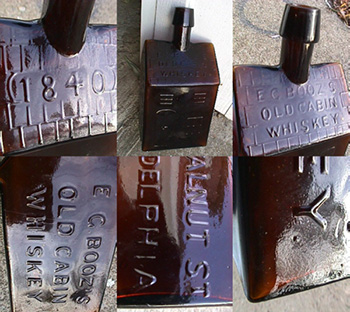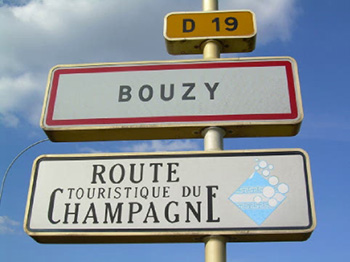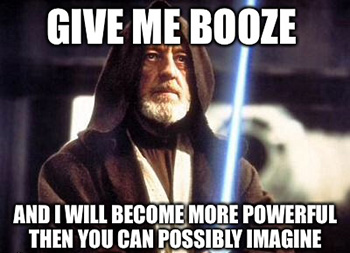On two recent trips we saw things that we thought could point to the origin of the word booze, on closer inspection it wasn’t quite that simple.
It all started in France on a champagne trip with Moet Chandon. When looking at a map of the 318 villages that make up the Champagne region one stood out, Bouzy. Our French isn’t great so we asked how it was pronounced, ‘boozy’ came the answer. It is one of only 17 Grand Cru villages and is known for producing high ABV wine.
Surely, we thought to ourselves, this can’t be a coincidence and so we pledged to do some more investigating. Before we found time to look at that Google however, we found ourselves in Kentucky with the lovely folks at Old Forester. Whilst visiting the annual Bourbon Festival we ducked into the on-site museum to have a nose about. Whilst there we saw a bottle in a display case with the brand name E. G. Booz, next to it was a plaque that read thusly:
BOOZ BOTTLE
Mr E. G. Booz, a liquor dealer, Philadelphia, 1840, gave the word “booze” to the American Language.
We decided ignore the fact that there is no such thing as the ‘American Language’ (it’s called English y’all) and concentrated on the other element. Mr Booz made alcohol and as a result the word Booze entered the English language. Well that makes sense.
There is however a tiny little issue. The word ‘booze’ was first published in the 17th Century, Mr Edmund G. Booz was born in 1824. Well bang goes that bloody theory (and proving once again that plaques should not always be believed).
It was in such common usage in the US that one of its founding fathers Benjamin Franklin, in 1737, published the word ‘boozy’ in a Pennsylvania Gazette article. Boozy is just one of over 200 words/phrases for being ‘inebriated’ Franklin lists. There are some absolute classics in there that should definitely be brought back:
His Head is full of Bees
He’s had a Thump over the Head with Sampson’s Jawbone
Wamble Crop’d
Sir Richard has taken off his Considering Cap
He’s Prince Eugene
Got on his little Hat
Has Taken Hippocrates grand Elixir
Seen a Flock of Moons
Like a Rat in Trouble
As Drunk as David’s Sow
Been too free with Sir John Strawberry
So there we have it, 1824 was too late a birth to give the honour to Edmund. He may well have helped the word become more widely used in the US, his bottles were very famous back in his heyday, but he wasn’t the origin.
Oui Oui Bouzy
So what about our little French village Bouzy? Well there is no date forthcoming for when the village was founded, however Champagne has been around since before the 17th century so we can reasonably rule out date being an issue. However this isn’t the only village with a similar name. 
In North Yorkshire sits Booze, a little village (so little in 2008 the Royal Mail stopped delivering post there, this has since been rectified) with a rich mining heritage. Once again a date of origin is hard to find, it did appear in the 1851 census but it is fair to assume it had been around a long time before then.
Whilst either of these villages could have some reason for being linked with the word there is absolutely no proof of this being the case. If there were no other explanations this may not be an issue, however there are a couple of other options. Also if your village gave the world the word booze you’d bloody well shout about it, hell you’d probably even fork out for a plaque.
First up in our final two is Rambooze. Rambooze is, not only a brilliant word, but also the name given to ‘A beverage made of wine, ale (or milk), sugar, etc.’. It was such a big part of British culture it is the title and main protagonist of a song by Charles Dibdin (a prolific composure and musician whose most famous song ‘Tom Bowling’ is often played at the Last Night of the Proms).
The song tells of how Rambooze can transform mere mortals and ‘clods’ to gods. The final verse goes like this:
But did I not stop I should never have done
In me all the deities centre in one
I’m as valiant as Mars, and as mighty as Jove
As cunning as Merc’ry, as a’rous as Love
I’m Appollo and Momus together for wit
And I boast an Olympus my godship to fit
For what better heav’n upon earth can I choose
Than good health, a kind wife, a true friend, and Rambooze?
Great name, great song (watch out for the White Dog cover version) but once again dates are against us. Finding an exact date for songs that old is not easy, the best guess is 1803, and good old Charles wasn’t born until 1745, meaning he misses our Franklin date by a couple of decades.
However that doesn’t rule out the word itself, it would have been round a while for him to write a song about it. Once again the dearth of knowledge on this drink fires up warning shots, if it was such a popular drink that it gave the world the word booze then surely we would all know about it right? 
Well for starters it is probably better known as the Rumboozle (and is similar to the Rumfustian), and ‘boozle’ is not the word we are looking for. Also, if you are wondering why these drinks have the word ‘rum’ in them (rum and ram seem interchangeable in the spellings) but contain no rum, it is because the word rum in this case is taken from the gypsy adjective for powerful. So if they are named after the word booze, as opposed to inventing it, then the drink translates as Powerful Booze. Which not only sounds a bit like an advertising campaign for Tennent’s Extra, but makes a fair amount of sense.
Back to our old friend dates, whilst they are never going to be 100% accurate for a drink this old, it is generally considered to have been consumed early to mid 17th Century. So it just about fits the timeline. Well it would if it wasn’t for the next explanation.
Here we have it and it’s bad news folks. The real reason is pretty dull. Like so many words in our language it is an amalgamation of serval words from across Europe. In the 14th Century there was a Middle English word ‘bouse’ which appears to have come from the Old High German ‘bausen’ which meant ‘bulge or billow’, the Dutch ‘búsen’ which meant ‘to drink excessively’ or ‘to get drunk’. There is also a word in the Old Dutch language ‘buise’ which translates as ‘drinking vessel’.
Scholars are still arguing about whether it came from the German or Dutch (it seems búsen is the current favourite), but they all agree these words gave us ‘bouse’ which in turn gave us ‘booze’.
Sorry about that. We wanted a more romantic or exciting story but as is often the way (just ask Bernie Sanders) it just wasn’t to be. However you can now shut up any annoying git that comes into your bar spouting shit about the origin and fact slap them.
To end on a more fun note, in New Zealand around the 1940’s a drinking binge was called a boozeroo. We are definitely bringing back. Now please excuse us whilst we go and get free with Sir John Strawberry.
A full list of Ben Franklins drunk words can be found here


